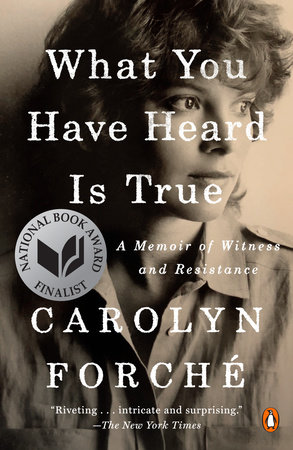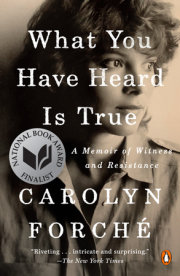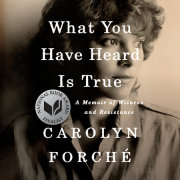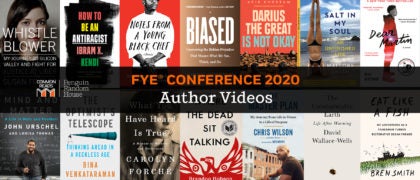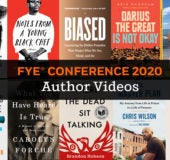It is near the end now. We are walking in the rippling heat of a sorghum field: cicadas whirring to an empty sky. A man uncorks a water gourd, another man leans against a spade. There is a woman here too, wearing an aproned skirt over her trousers. Hard light and the dry rattle of sorghum seed heads. I'm holding a spray of seeds. One of the men takes Leonel aside and tells him something-a secret, like everything else. We get into the jeep and without explanation drive to another place, not far from this field. The campesinos, rural peasants, would have walked, measuring distance not in kilometers but in hours or days.
"What are we looking for?" I ask, and as always, he doesn't answer, swearing under his breath through the haze of smoke that hangs in the air where the corn had been growing. We stop near a cluster of champas, shacks made of mud and wattle. One of them has collapsed and smoke rises from it.
"Wait here," he tells me, but I don't wait. I had stopped waiting for him months before this, but he can't seem to break this habit of telling me to wait. Smoke is rolling like a shore cloud along the fields just above the blackened stubble. We walk, and when he stops, I stop, and when he continues, I continue. He palms the air to say "Slow down" or "Be quiet." I slow down and am quiet. When we reach the champas, no one is in them. No one is home. A large plastic bowl used for making the slurry that becomes tortilla dough is overturned on the ground. There is a child's T-shirt in the tortilla slurry. Behind one of the champas it appears that several hens have been held by their feet and whacked against a stone. They are lying on the ground, one of them still opening and closing its beak.
A hundred or so meters more, and we hear the whine of flies, the hissing and belching of turkey vultures, a flapping of wings like applause in the maize stalks as the fattened birds try to lift themselves. A flatbed truck follows at a distance behind us, with three campesinos standing in the back. They are calling out to us or to the driver of the truck but I donÕt understand what they say.
I don't know what I had expected to see, but not the swollen torso of a man with one arm attached to him, a black pool of tar over his crotch. I didn't expect that his head would be by itself some distance away, without eyes or lips. The stench in the air is familiar: a rotting, sweet, sickening smell. Human death. I bend down when I see the head, but I hear Leonel saying, "Don't touch it. Let the others do it."
At first, I thought they were going to find the rest of the man and place his remains in the truck but instead they gather the arms and hands, the legs with their feet attached, and bring them to the torso where it lies on the ground. They set the head on the neck where it once had been, then the three men take off their straw hats and stand in a circle around the man they have reassembled. They stand and one crosses himself lightly. The parts are not quite touching, there is soil between them, especially the head and the rest. No eyes, no lips or tongue, birds nearby hoping we will go away and leave them to this meal. The air hums, we walk. Why doesn't anyone do something? I think I asked.
On this day, I will learn that the human head weighs about two and a half kilos.
Over the years, I have asked myself what would have happened if I hadn't answered the door that morning, if I'd hidden until the stranger was gone. Knowing him as I came to know him, he would have sensed my presence and continued ringing the bell. On that day, I had been at my typewriter, a heavy IBM Selectric that a friend would later complain sounded like a machine gun. There were stacks of papers everywhere: human rights reports, students' essays and poems, unfinished manuscripts, unanswered correspondence. A sea wind passed through the screens, lifting some of these papers into the air and sailing them to the floor. The finches were singing atop their bamboo cage, as its door was usually open, leaving them to fly about the house, perching on ceiling fixtures and open doors. In those days, I could type faster than I could think-my father saw to that when I told him I wanted to be a poet. I would need to be able to "fall back" on something, he'd said. Fall from where? I had wondered to myself at the time. The typewriter was set on the kitchen table, and most days I worked there, the ocean almost audible, the air scented by the fields of nearby flower farms. As it was late morning, the harvesters of Encinitas had already left for lunch, having begun their work at dawn. At first, I might not have noticed the sound of the van pulling into the driveway, but its engine remained idling, so it wasn't simply turning around. Then the engine died and the doors were opening.
It was not my habit to answer the door when I was alone. My mother had been strict about this with her seven children. She couldn't watch all of us at once, she would say, so there were rules. Not opening the door to strangers was one of them.
We had moved to this town house hurriedly, my housemate and I, from an apartment we had also shared, after receiving mail from a town to the north of us, an envelope that contained lewd photographs of a man, with a note telling us that he was "coming to visit" and we were "not to contact the police." The police had said that there was nothing they could do until "something actually happened," and therefore it might be best for us to move somewhere else. So here we were, in a new, unfurnished town-house rental nearer the ocean, as far from the city as we could reasonably live and still commute to the university where I taught and Barbara studied. Twenty-eight miles-far enough.
The vehicle that was not turning around was a white Toyota Hiace. From the window, I could see a man get out and sling a tote bag over his shoulder, with papers escaping from the top. Then the back panel door slid open, and two very young girls climbed down and stood beside him. I remember reassuring myself that an ax murderer probably wouldn't travel with two young girls. When the man looked up at my window, as if he knew I was there, I moved away and cowered against the wall. The dust-covered Hiace had El Salvador license plates.
What I knew of El Salvador, I knew from my Spanish professor in college, himself a Salvadoran, and from stories told during the previous summer when I lived on the island of Mallorca in Spain. I had traveled there with my friend Maya to translate the work of her mother, the expatriated Central American poet Claribel Alegr’a. The Salvadoran Spanish professor occasionally showed slides to the class, most especially of his family's houses and gardens. Everything I knew about the isthmus of the Americas at that time I knew from Claribel's poetry and the professor's luminous images projected onto a blank wall.
The doorbell rang, then rang again.
On the other side of the door, the girls' voices rose in delight, possibly at their first glimpse of the rabbits: does and their young kits leaping in the stubble of garden. The hutch door had been left open. I studied the stranger through the peephole: a tussle of dark wavy hair, a short black beard, heavy eyeglasses. The girls hid behind him, but because they were here too, I opened the door as far as the chain lock would allow.
The man standing on the porch seemed amused by this.
"You are Carolyn ForchŽ," he said through the opening, "and I am Leonel G—mez Vides. These are my daughters, Teresa and Margarita."
"I'm sorry," I said, "just a moment." I closed the door and leaned against it. I had heard this name last summer in Deiˆ. This was Claribel Alegr’a's cousin. Her mother was the sister of his mother. That summer, Claribel sometimes spoke of this Leonel with great affection, but at other times she seemed not to want to say very much. I sensed admiration, caution, and also a little fear, but I couldn't work out whether it was fear of him or for him.
The name Leonel G—mez was usually mentioned when Claribel and her family were talking about El Salvador, where Claribel had spent her childhood. These conversations concerned people who had been killed there, or who had disappeared, among them their friend the poet Roque Dalton, murdered just two years earlier-the handsome revolutionary who had once escaped from prison, according to the legend, when an earthquake shook his cell walls to the ground just before he was to be executed. In stories like this they often also brought up Leonel but when this happened Claribel quickly changed the subject, especially if I seemed at all curious. When I asked Maya about this secrecy, she waved away my concerns with Mami's just tired, or Mami's still grieving over Roque. There came to be an unspoken rule: Don't bring up Roque or Leonel around Mami.
Now this mysterious Leonel was standing on my porch in Southern California with his daughters. How was that possible? Wanting to be sure of who he was, I went upstairs for the envelope of snapshots I'd taken in Deiˆ. This seems odd to me now-that I should have required some proof from him, as he did in fact resemble the handsome youth straddling a motorcycle in the photograph that Claribel kept in her study.
When I opened the still-chained door again, I passed the pictures to him, asking that he identify the people turning toward the camera: the wiry, silver-haired man with the cigarette, the woman in a cocktail dress, raising a glass, and the young one, a former ballerina, sitting tall in her chair-my good friend Maya, the poet's daughter. There were others too, a few of the regulars who gathered on the terrace of the poet's house in the afternoons to drink and talk and watch the sun slip behind the peak of the Teix, but I wouldn't have expected him to know who they were.
"This is Claribel," he said, tapping her face with his fingertip. "And there is the husband, Bud. And this?" His voice softened. "This must be Maya. It is Maya, isn't it?"
"Come in, please come in, I'm sorry to keep you waiting, and I'm sorry to have . . ."
"No, it's okay. I like that you checked me out. You were being careful."
The girls were looking around a bit apprehensively. How strange that house must have seemed, so bare walled and empty. Our kitchen table also served as our desk. We used a soup bowl for an ashtray. Our finches flew about the house as they wanted, but mostly they remained on their perches near the cups of millet. There was a small vegetable and herb garden planted on the side of the house. My friend and housemate, Barbara, had taken care of it all summer while I was in Spain. The rabbits were the offspring of Easter bunnies given to us by my students: two females and a male, as it turned out. What were we supposed to have done with them? On this morning, twenty-three rabbits were living in the hutch and garden.
The only furniture was the kitchen table with its four ladder-back chairs, two mattresses on the floors of our upstairs bedrooms, and a single daybed in the living room that we used as a couch. In one corner of the living room, a papier-m‰chŽ calliope horse painted red, about four feet high, reared on its hind legs. There were flowers on its rump. Leonel stopped when he saw it, seeming taken aback.
"How long have you had this?" he asked, laughing, shaking his head.
"I don't know. A friend found it in a bin on the street. Why?"
"No, just asking. But it's yours, right? It's your horse?"
We had drifted into the kitchen, which must also have seemed odd, with nothing on the countertops, and no sign that food had ever been prepared there. The girls kept close to their father, pinching his shirt to their faces, but slowly they began to steal glimpses of me.
"Do you like rabbits?" I asked, remembering the Spanish word, conejos. "They're in the hutch in the garden-do you want to see? There are two mothers, and the babies are a month old. Go ahead, you can play with them."
Leonel bent down for them to whisper in his ear, and he nodded that it was okay for them to go outside.
"Do you have any coffee? I've been driving for three days. I'm dead. And can you clear this stuff off the table? There are some things I need to show you. We have work to do."
Work? I remember thinking then, What work? But he was already pushing my papers aside and unpacking his woolen bag, woven with symbols and animals, among them an openmouthed wildcat about to pounce.
\
He began covering the cleared table with white butcher paper cut from a roll he had brought, taping it down, and in the center, he placed what few objects he could find in our cupboards: salt and pepper shakers, a shot glass of toothpicks, a paring knife, matchbooks, and to these he added things taken out of a second, smaller bag: a miniature metal replica of a World War II battleship, a Swiss Army knife, wooden matches and a pouch of Balkan tobacco. Then he set a pack of my cigarettes among these things.
"These cigarettes are now a military garrison. Sit down." And then, "How much do you know about military dictatorship?"
No small talk, no How is Claribel? Just How much do you know? I didn't know what to make of him.
Leaning over the paper, he began drawing a map of his country, almost without looking, moving the pen in a continuous bleed of ink, traveling in memory from the Guatemalan border south to the Bay of Fonseca, then east toward Honduras, suggesting the volcanic peaks and mountain ranges of El Salvador with a string of chevrons.
"Nothing," I answered. "I know nothing about military dictatorship."
His elbows were on the map, his folded hands pressed against his mouth. I saw myself in his glasses, two of me, and the girls' laughter was sieved through the kitchen screens.
Copyright © 2019 by Carolyn Forché. All rights reserved. No part of this excerpt may be reproduced or reprinted without permission in writing from the publisher.

